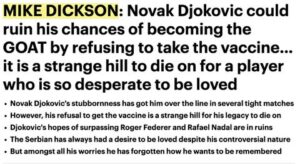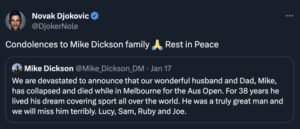
British Sports Writer Mick Dickson Passes Away While Covering Australian Open
Mick Dickson, a well-known British sports writer, passed away suddenly while covering the Australian Open in Melbourne. The 59-year-old journalist, known for his critical stance towards Novak Djokovic, collapsed and died under circumstances that are yet to be fully explained.
The Controversial Figure
Dickson was a prominent figure in sports journalism, but his reputation was significantly marked by his vocal criticism of Novak Djokovic’s stance on Covid-19 vaccination. Throughout the pandemic, Dickson was relentless in his criticism of Djokovic, particularly focusing on the Serbian tennis star’s decision to remain unvaccinated. Dickson’s reporting often featured sharp commentary and skepticism about Djokovic’s choices and their potential impact on his career.
In one notable headline, Dickson wrote, “Novak Djokovic could ruin his chances of becoming the GOAT by refusing to take the vaccine… it is a strange hill to die on for a player who is so desperate to be loved.” This statement, among others, reflected Dickson’s strong disapproval of Djokovic’s position on the vaccine, which became a recurring theme in his coverage of the tennis star.
The Sudden Passing
The news of Dickson’s death came as a shock to many. According to a statement shared by Collin Rugg on X, the British reporter was in Melbourne to cover the Australian Open when he collapsed and passed away. The statement from Dickson’s family read, “We are devastated to announce that our wonderful husband and Dad, Mike, has collapsed and died while in Melbourne for the Aus Open.”
The cause of Dickson’s death is currently unknown, and an investigation is underway to determine the exact circumstances surrounding his sudden collapse. The suddenness of his passing has left many in the sports journalism community and beyond in a state of shock and sadness.
Djokovic’s Reaction
In response to the news of Dickson’s death, Novak Djokovic, who is currently competing in the Australian Open, has expressed his condolences to the Dickson family. Despite their public disagreements, Djokovic took a moment to pay his respects, acknowledging the gravity of the situation. “My thoughts and condolences are with Mick’s family during this difficult time,” Djokovic said. “The loss of someone in the media who covered the sport is a reminder of how interconnected our lives are, even when we have differences.”
Djokovic, who is aiming to defend his Australian Open title and extend his record to eleven titles at the tournament, has focused on his performance on the court amid the news. The Serbian star remains committed to his campaign in Melbourne, seeking to build on his legacy as one of tennis’s greatest players.
A Legacy of Debate
Mick Dickson’s death has reignited conversations about the role of journalists in covering athletes, especially when their views clash with those of the public figures they report on. Dickson’s critical stance on Djokovic’s vaccination decision highlighted the contentious nature of sports journalism during the pandemic, where personal health choices of athletes often became a focal point of public debate.
Throughout his career, Dickson was known for his strong opinions and willingness to tackle controversial subjects. His reporting on Djokovic was just one example of his broader approach to journalism, which frequently involved taking bold stances on contentious issues.
The Impact of Criticism
The dynamic between athletes and the media can be complex, particularly when controversial topics arise. Dickson’s coverage of Djokovic is a case in point, illustrating how deeply personal decisions can become public fodder. Djokovic’s vaccination status was a significant point of contention during the pandemic, and media figures like Dickson played a role in shaping the narrative around these issues.

While Dickson’s critical perspective on Djokovic drew significant attention, it also highlighted the broader challenges athletes face when navigating media scrutiny and public opinion. Djokovic’s own experience with the media has been marked by intense scrutiny, and his response to Dickson’s death underscores the often fraught relationship between athletes and journalists.
Reflecting on the Loss
As the sports world processes the news of Mick Dickson’s passing, there are moments of reflection on the intersection of personal and professional lives. Dickson’s sudden death serves as a poignant reminder of the human aspect behind the headlines and the impact of critical journalism on both the subjects of reporting and the public.

For Djokovic, the loss of Dickson, despite their professional disagreements, represents a moment of introspection. The world of sports journalism is filled with figures who both challenge and support athletes, and Dickson’s contributions to this field were significant, if not always agreeable.
Moving Forward
As the Australian Open continues, the tennis world will keep an eye on Djokovic’s performance, hoping for a successful defense of his title. The tournament remains a stage for showcasing the resilience and determination of athletes like Djokovic, who strive for excellence despite external challenges.

Meanwhile, the sports journalism community will remember Mick Dickson for his impactful and often polarizing coverage. His passing is a reminder of the complexities and responsibilities that come with reporting on the lives of public figures, and the deep connections that can exist between journalists and their subjects, even amidst disagreement.
As the investigation into Dickson’s death continues and his family and colleagues come to terms with their loss, the broader conversation about the role of media in sports and the nature of public scrutiny will likely persist. Dickson’s legacy, both as a journalist and as a figure in the sports world, will be remembered and analyzed in the context of his contributions and the impact he had on the narratives surrounding major sports figures like Novak Djokovic.
Leave a Reply